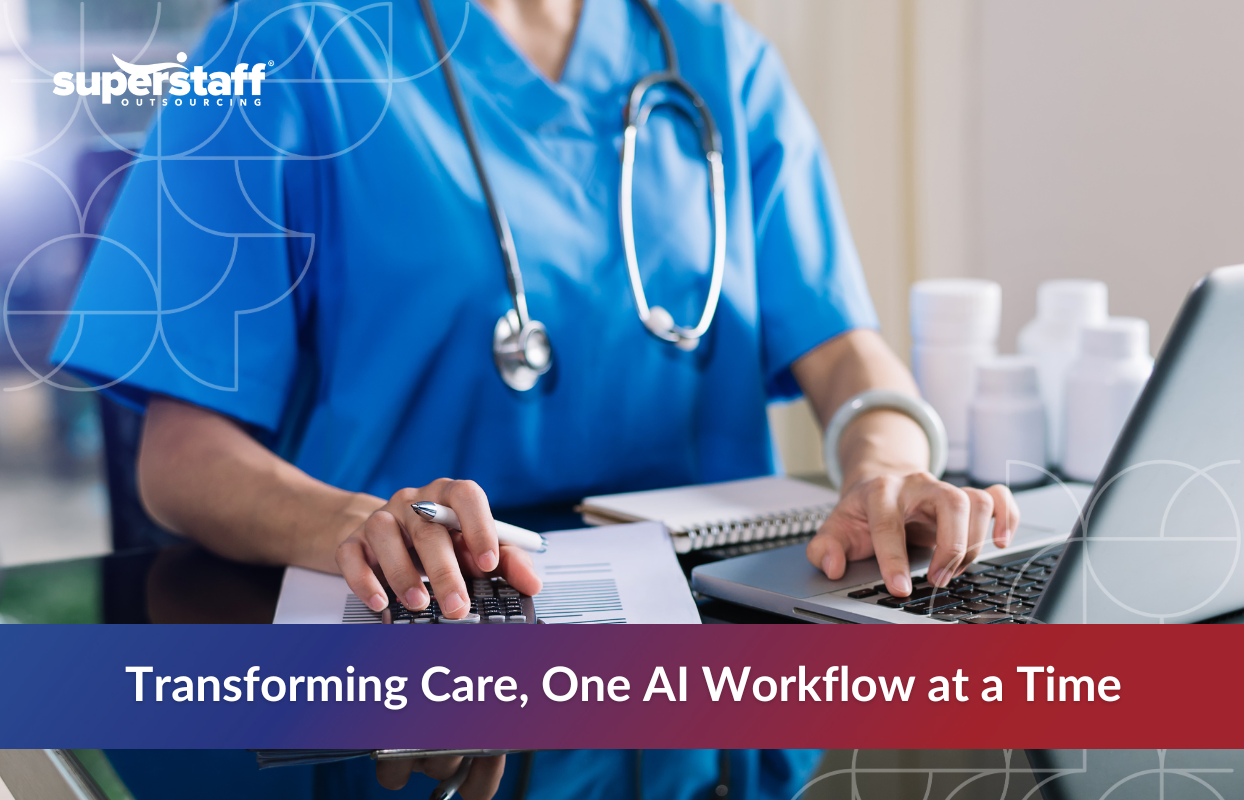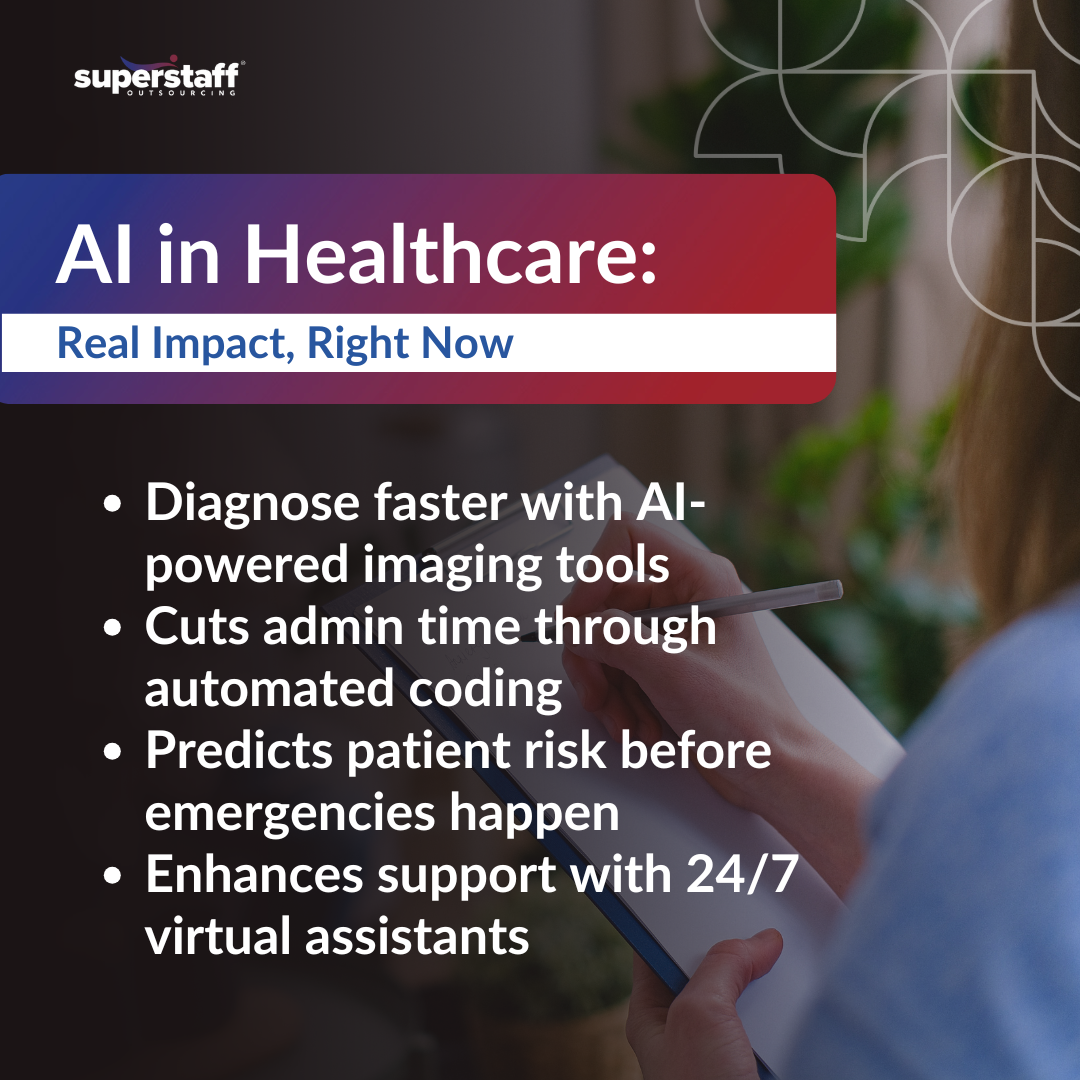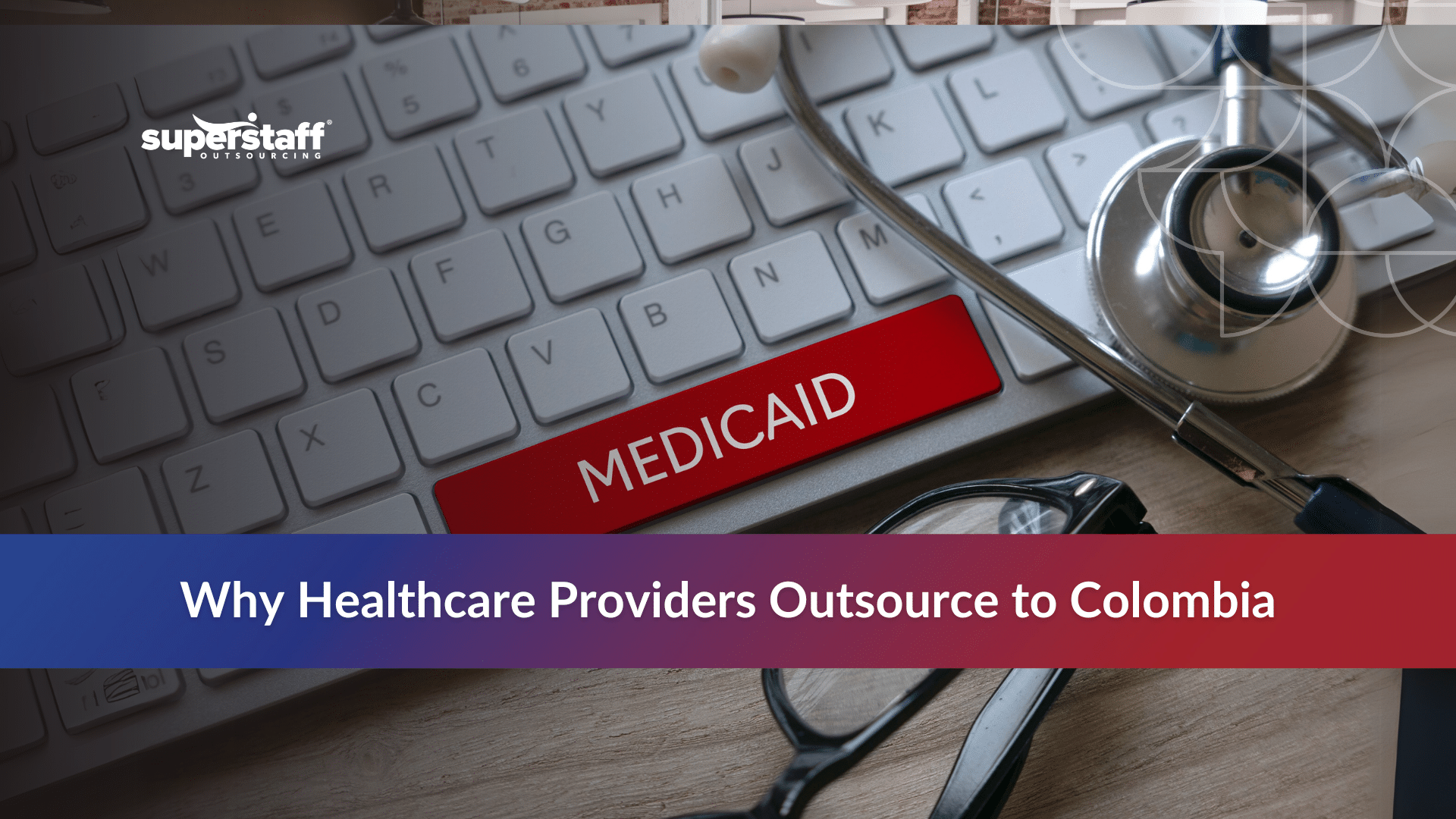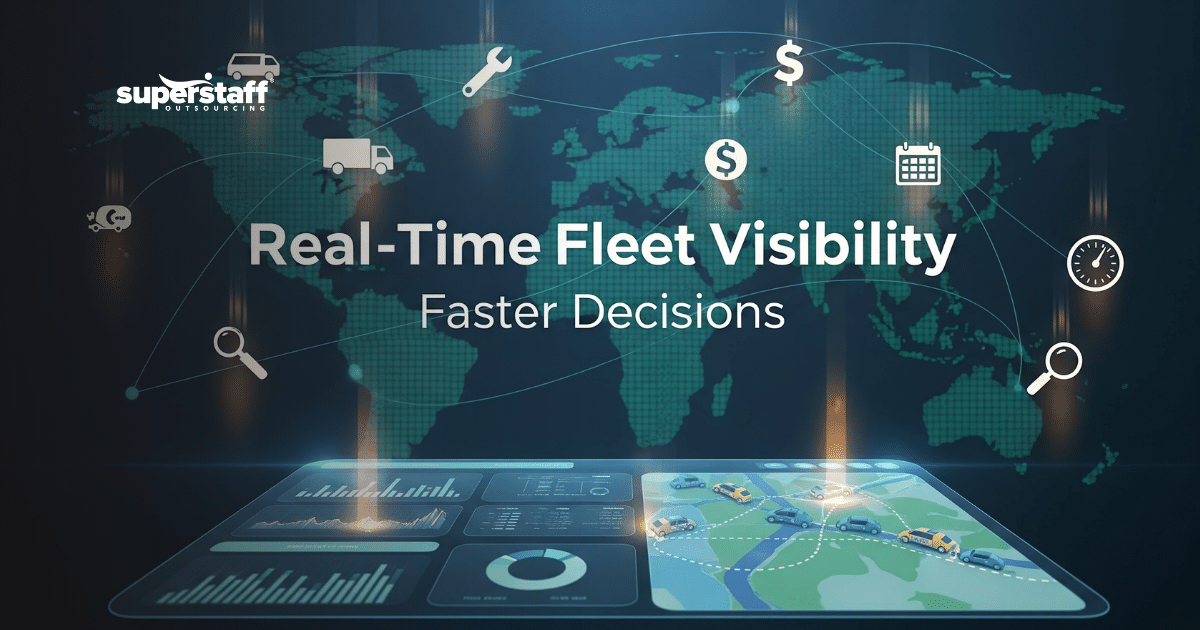
Artificial intelligence is no longer a distant vision — it’s transforming healthcare today.
Across hospitals, clinics, insurance providers, and telehealth platforms, we’re seeing AI technologies streamline how care is delivered and how patients are supported. From predictive analytics to automated intake systems, AI in healthcare is solving age-old problems that used to slow down care, overburden staff, and frustrate patients.
This blog explores how AI is enhancing healthcare workflows and why pairing it with smart outsourcing strategies leads to better patient outcomes. We’ll look at how organizations are using AI today—not hypotheticals—so healthcare leaders can clearly see the role it plays in delivering faster, safer, and more efficient care.
AI Is Driving Measurable Improvements in Healthcare Operations and Patient Engagement

In every corner of the healthcare ecosystem, artificial intelligence is helping providers and administrators work smarter. The most innovative systems aren’t just using AI to reduce paperwork—they’re using it to make better decisions, faster.
Take diagnostic imaging, for instance. AI algorithms are now able to analyze medical images with incredible accuracy, assisting radiologists in spotting abnormalities that might otherwise be missed. And in high-pressure environments like emergency departments, AI-powered clinical decision support tools are helping doctors rapidly assess symptoms and determine the best course of action.
Then there’s risk prediction. With the help of AI, healthcare providers can identify patients at high risk for conditions like diabetes or cardiac events before those issues become emergencies. These predictive models allow for earlier intervention and more proactive care.
On the patient engagement side, AI-powered virtual assistants and symptom checkers are now a front-line resource for patients with common concerns. They can book appointments, remind patients about medication, and even answer basic insurance questions—all without the patient having to sit on hold or wait in line.
According to McKinsey, if today’s AI technologies are widely adopted within the next five years, the U.S. healthcare system could see net savings of $200 billion to $360 billion annually, underscoring just how impactful this transformation can be at scale.
But even as AI capabilities grow, implementing them effectively isn’t just about buying the latest software. Successful transformation requires integration, strategy, and—more often than not—human support behind the scenes.
Operational Efficiency Is Where AI Delivers Immediate, Scalable Value
Administrative inefficiencies are among the biggest obstacles to timely, high-quality care. That’s why some of the most powerful uses of AI in healthcare focus not on the exam room but on the back office.
Medical coding, for example, is a complex and time-consuming process, especially for high-volume practices. AI tools are now capable of scanning clinical notes and automatically generating the right codes for billing and claims. This not only reduces the administrative load but also minimizes costly errors and claim rejections.
Claims processing is another area where healthcare process automation is proving essential. Instead of waiting days—or weeks—for approvals, AI systems can review documentation, flag inconsistencies, and push claims through faster. The result? Quicker reimbursements and fewer headaches for providers and patients alike.
Smart scheduling tools, powered by machine learning, are also improving patient flow. These systems analyze availability, patient urgency, and provider workload to recommend the most efficient appointment times. When patients are matched with the right care at the right time, both outcomes and satisfaction improve.
AI can even handle document extraction—pulling data from scanned records, lab results, and faxes—and automatically updating EHRs and other systems. That’s not just convenience; that’s critical time saved in emergency situations.
Still, no matter how advanced the tools, they’re only as effective as the team implementing them. And when the workload scales up, even the best technology needs human reinforcement.
Combining AI with Outsourcing Creates a High-Performance Support Model
Here’s where things get really exciting. The synergy between AI and outsourcing isn’t just theoretical—it’s already reshaping how leading healthcare providers operate. By combining powerful automation with human expertise, outsourced support teams can offer the best of both worlds: speed and accuracy with a human touch.
Imagine a patient trying to schedule a procedure, get insurance pre-approval, and understand their out-of-pocket cost—all in one call. AI tools can handle the initial intake and verification, while skilled outsourced agents step in to manage nuanced concerns, offer clarification, and handle escalations with empathy.
Or consider the billing department of a growing clinic. Outsourced agents working alongside AI-powered claim tools can resolve disputes, follow up on denials, and respond to patient questions in real time. This not only improves the billing cycle but also reduces frustration for patients trying to navigate complex financial systems.
What’s more, AI-enabled outsourcing brings cost savings without sacrificing quality. While AI tools reduce the need for repetitive tasks, outsourcing providers ensure that the more complex, people-driven elements are handled with professionalism and care.
Done right, this hybrid model doesn’t just trim expenses—it becomes a value generator that enhances service delivery and strengthens the patient-provider relationship.
AI-Enabled Outsourcing Helps Healthcare Providers Focus on What Matters Most: The Patient
The heart of healthcare has always been—and always will be—the patient. But too often, doctors, nurses, and care coordinators are bogged down by paperwork, administrative duties, and disjointed systems. AI-enabled outsourcing is freeing them to focus where they’re needed most.
Take a hospital system that integrates AI-based claims processing and pairs it with an offshore team trained in healthcare administration. Internal staff now spend less time chasing insurance companies and more time with patients at the bedside.
Nurses benefit, too. Instead of juggling appointment reminders and prescription refills, they can rely on virtual assistants and call center teams to manage those tasks efficiently. With fewer distractions, clinicians can devote their full attention to delivering compassionate, personalized care.
Error reduction is another crucial benefit. When outsourced teams and AI tools collaborate on tasks like documentation, scheduling, and eligibility verification, the margin for error shrinks significantly. This ensures continuity of care and reduces costly delays due to miscommunications or inaccuracies.
Follow-up care is also more consistent. With AI-powered reminders and outsourced care coordinators ensuring patients attend follow-ups, refill prescriptions, or report symptoms, healthcare organizations can close more loops and prevent readmissions. That matters more than ever, considering that, according to the Centers for Disease Control and Prevention (CDC), 21.7% of U.S. adults in 2022 delayed or skipped medical care due to various nonfinancial barriers.
It’s not just about doing more with less—it’s about doing better with what you have. And that only happens with the right blend of technology and people.
Selecting the Right AI-Capable Outsourcing Partner Is Key to Sustainable Transformation
All these benefits—faster claims, better care coordination, happier patients—don’t come from technology alone. They come from partnerships. For healthcare organizations looking to adopt AI solutions, finding the right outsourcing partner is just as important as selecting the right tools.
First, compliance can’t be compromised. The best partners offer HIPAA-compliant workflows, secure systems, and a proven understanding of healthcare regulations. Patient data is sacred, and your partner must treat it that way.
Second, domain expertise matters. An outsourcing team that understands EHRs, insurance platforms, patient support systems, and medical terminology can onboard faster, perform better, and integrate more seamlessly with your internal teams.
Third, scalability is critical. Whether you’re a growing clinic expanding into telehealth or a hospital navigating a seasonal surge, your outsourcing partner should be able to flex with your needs, without sacrificing quality or speed.
That’s where trusted providers like SuperStaff come in. By combining healthcare process automation with trained professionals who understand the nuances of your industry, SuperStaff delivers a holistic solution tailored to the needs of modern healthcare leaders.
Because at the end of the day, AI in healthcare is only as effective as the people and partnerships behind it.
Why AI in Healthcare Is the Key to Better Patient Care
Artificial intelligence isn’t just reshaping the future of healthcare—it’s actively transforming how care is delivered right now. From streamlining documentation to enhancing patient support, AI in healthcare is driving meaningful improvements that impact real lives.
But to bring these innovations to scale, healthcare organizations must think beyond the software. The smartest approach combines AI with strategic outsourcing, where expert human teams back up automation and ensure the patient always comes first.
If you’re ready to harness the full potential of AI in your healthcare operations, consider partnering with a trusted BPO provider that understands both the tech and the people behind it. At SuperStaff, we specialize in AI-powered outsourcing solutions that improve healthcare workflows while delivering the compassion and care your patients deserve.
Let’s transform healthcare together—one smart process at a time. Reach out to SuperStaff today to learn more!






